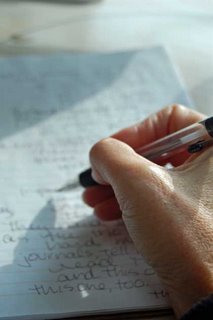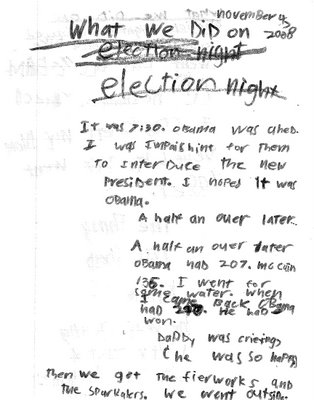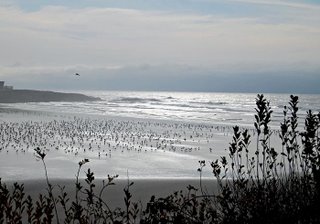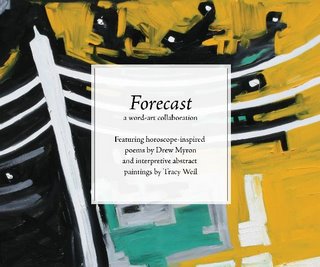In praise of light
 We're half deep in the official month of giving thanks. Why limit our gratitude to a single day?
We're half deep in the official month of giving thanks. Why limit our gratitude to a single day?
In my childhood, we wrote thank you notes year-round. Taught by my mother early on, offering appreciation was an exercise, both in writing and in the power and importance of gratitude.
As I got older, I was glad for the training. I knew that attending a party, or landing a job interview, required the same decorum: Express your gratitude, and right away.
It’s probably because I love to write — from grocery lists to customer service surveys — that I’ve always enjoyed penning thank you notes. And I’m nearly giddy when I am the recipient of the same.
The magic of gratitude is that the more you acknowledge good acts, gifts and intentions, the more you attract. Goodness multiplies. The more you appreciate, the more you see to appreciate.
The other night at the Young Writers Group (a weekly gathering of teen writers and adult mentors), I shared Barbara Crooker's “Praise Song," a poem I had carried with me for three years.
We went around the circle, each of us reading a line. As we focused on every single word before us, the air shifted, grew still and reverent. We seemed lifted in a sort of poetic praise. Indeed, we were in song.
We then used the poem as a prompt, writing on thankfulness for 15 minutes. The students were rapt. Pens flew fevered across paper. The results were strong.
And that just may be the beauty of gratitude. It encourages a single-minded focus while flooding the heart with rest and rejuvenation.
The next afternoon, after three days of high winds and fire-hose rains, the sun reappeared grand and sure. A full moon brought the drama of high tides, coupled with a clear blue sky.
From a damp sandy beach, I sat washed with appreciation. I wrote scores of thank you notes, and offered gratitude like candy, sweet and easy.
I praised the post office crew that keeps me connected to the busy world beyond this small town and big sea.
I praised volunteers who join me each week to read with the youngest and write with the oldest. Those whose greatest gift is the willingness to listen and to love.
I wrote more and more — notes sent and unsent — to teachers and mentors from years ago, to people who’ve come and gone, who touched me deep for just a bit, or stayed for years steady and sure. To those whose names I never knew but whose actions marked my heart. To those who have passed, and to those still finding their way.
As pelicans circled the churning shore, I sat hushed and still, praising soft light and long shadows, all it touches, all it reveals.
Praise Song
Praise the light of late November,
the thin sunlight that goes deep in the bones.
Praise the crows chattering in the oak trees;
though they are clothed in night, they do not
despair. Praise what little there's left:
the small boats of milkweed pods, husks, hulls,
shells, the architecture of trees. Praise the meadow
of dried weeds: yarrow, goldenrod, chicory,
the remains of summer. Praise the blue sky
that hasn't cracked yet. Praise the sun slipping down
behind the beechnuts, praise the quilt of leaves
that covers the grass: Scarlet Oak, Sweet Gum,
Sugar Maple. Though darkness gathers, praise our crazy
fallen world; it's all we have, and it's never enough.
— from Radiance, 2005, published by Word Press
From the pens of babes
Secrets

This and more at Post Secret, a simple art project that began four years ago with a collection of anonymously decorated postcards revealing secrets never told. The idea -- and the catharsis -- proved so powerful that secrets now fill several hefty volumes, and a wildly popular website that is updated weekly.
Applause at the intersection
 Eager to drive in the traffic of creative space, I am giddy with the intersection of art and words at Action Poetry.
Eager to drive in the traffic of creative space, I am giddy with the intersection of art and words at Action Poetry.Simple and brilliant, the website features 11 poems written and read by Billy Collins, with each poem paired with a short, animated film.
A prolific writer and a former U.S. Poet Laureate, Collins is considered one of the nation’s most ‘accessible’ (code: he writes poems that are easy to enter, understand and enjoy) poets.
Produced in 2007, the animated poems were initially intended as filler between programs on the Sundance Channel. To that end, advertising powerhouse J. Walter Thompson commissioned a variety of artists who created a blend of wry, amusing and unexpectedly touching poems-on-film.
As with Poetry in Motion (the New York program that posts poems on subways and buses) and Poem in Your Pocket Day (celebrating National Poetry Month), Action Poetry shows what happens when words climb out of books to lift off the page and soar into a larger world.
Poetry lives in the everyday — and what a beauty when it emerges in such unexpected ways.
Yes and No
Simple questions can reap the most conflicted answers.
move asked if I enjoyed living on the ocean's rim. The question
spun in my head for days before this answer emerged:
From the Oregon Coast, in answer to her inquiry
When she asks how I like living on the edge of the earth,
I do not answer right away. On the third dawn, rain arrives,
steady and firm, wears me awake. I cocoon in bed.
In the dark hours, I say cocoon. I make it mean that I am
happy and satisfied in this warm bed with its thick blanket.
But my cold feet want to burrow in familiar softness,
want to know a morning without socks.
I have turned inside myself.
In these four years on the basalt line, I know variations
of mold, beyond the fuzz of overgrown cheese, the kind
of insistent dank that coats every corner, eats every crevice.
And mildew. My sense of smell as strong as sight. The sour
milk of old homes, the odor of wet wood and dirty secrets.
When she asks, I know she wants hope and harmony and the
possibility of every new thing. I know. I asked, too.
On my first visit, I sat under an airbrushed sky, sated on a
soft beach shore. I grew tall, lithe, lean.
Here, I said, I will be a better person.
I did not know irony or hesitation.
Every pore bore happiness.
When she asks, I am lying on the couch,
curled over hot coffee. The air is heavy as stone.
Hundreds of gulls float like confetti across a static sky.
I am fixed, haunted with sadness or fear or illness,
I’m not sure which, and I write letters to friends I no longer
know. My husband brings flowers and rubs a calloused hand
over my lined, tired face. Without words or pause, he is trying
to erase what we don’t understand. And I am eating peanuts
by the bowl, and moaning with regret. And I am driving the
car and crying because it is only in motion that I feel progress,
and only in progress that I remember to breathe, and though I
clutch the inhaler in my sweaty palm, this is not an asthma attack
because attack implies sudden and for weeks my throat closes
around words, my lungs grasp for air.
I call it malaise because with this word, like cocoon, my mouth
goes soft and southern and I am reborn gracious, relaxing on a
wraparound porch, talking in a drawl that pulls us in a warm,
full circle.
When she asks, I pause, remind myself that we chose this place.
To leave family and friends and jobs and cities and movies and
restaurants and all that seemed too big, too much, too pressing.
All of it crushing us into small, petty people with small, petty
gripes about heat waves and barking dogs and freeways clogged.
When I answer, I will remember how we invited this adventure,
the Uhaul packed tight, our smiles wide and sure as we drove
from everything safe and good and right. We were exploring
what we didn’t know, in a place that would ebb and flow,
test and reward.
I will tell her of light on waves, after days of rain
how the sun meets the shore, breaks me down and apart,
releases something like hope.
And everything is green and fresh and ferns and quiet.
Vast.
I will offer this: Words cannot explain the beauty
but I keep trying in letters, in lines like this,
in the way I return his grip, grateful, saying,
Yes, I am blue in this bigness.
And still, and still, again and again,
though I doubt and forget,
the sky opens, gulls circle and land,
my heart flutters and expands.
— Drew Myron
A call for (creative) action
Dear readers, writers, artists, and eager, inviting minds:
In the interest of encouraging art and poetry,
In the advancement of new forms of old expression,
In a call for the experience of truth and power and joy,
You are invited,
encouraged,
urged
To enjoy,
read,
purchase,
Forecast, the special edition exhibition book
combining paintings by artist Tracy Weil
and poetry from writer Drew Myron.
Just in time for
the holidays,
everyday,
today.
Forecast is
the ideal gift,
guilty pleasure,
blissful, joyful, engaging
intersection of art and words.
Get it here.
Buy now. Enjoy always.
Fishing well
If each day falls
inside each night,
there exists a well
where clarity is imprisoned.
We need to sit on the rim
of the well of darkness
and fish for fallen light
with patience.
Search & Stumble
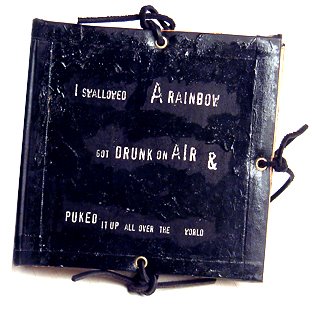 The world is so big, with so much to see. Thanks to StumbleUpon.com, I get a kaleidoscope view. And you can, too!
The world is so big, with so much to see. Thanks to StumbleUpon.com, I get a kaleidoscope view. And you can, too!Check out StumbleUpon.com, a powerful website sampler offering a grab-bag of souped-up, search engine surprises. The free service matches your personal preferences and interests to thousands of websites and blogs, many of them obscure little treasures you would have never found on your own.
When I’m feeling stuck or uninspired (or avoiding the laundry, the bills, the deadlines looming), I stumble for a creative restart.
Today’s favorite stumble is Linda Zacks, a New York artist experimenting with art and words to produce an intriguing mash of edge and allure.
An accomplished graphic designer and illustrator, Zacks also creates one-of-a-kind handmade books incorporating the art of typography and photography. I especially love the way type emerges as an artform in the gritty book (pictured above), "I swallowed a rainbow, got drunk on air & puked it up all over the world."
Life is short — but unbearably long when rules and responsibilities slow your step. Go ahead, take some time to stumble around.
Ordinary things
 We are in the transformation season. In this thin, long autumn light, the ordinary becomes extraordinary. I am hushed by the turning. This morning, the wren outside my window is a palm-sized wonder: that small beak, the focused bead eyes, every little feather.
We are in the transformation season. In this thin, long autumn light, the ordinary becomes extraordinary. I am hushed by the turning. This morning, the wren outside my window is a palm-sized wonder: that small beak, the focused bead eyes, every little feather.This must be what new parents feel, the discovery of every detail, all of it a miracle, all of it so ordinary, saying again and again, how did we not see? before this, how did we see at all?
In spring’s crisp newness, life bursts with fresh possibility. But in this dying season, I feel a similar sense of wonder, though tempered with patience. Now, in these short days, there is a tender ache of acceptance. We are all so beautiful, all so flawed.
It’s a shame and a mystery, really, how our sight changes, how autumn’s soft glow can lift and elevate, can help us see in everything beauty. In beauty, everything.
The Patience of Ordinary Things
Pat Schneider
It is a kind of love, is it not?
How the cup holds the tea,
How the chair stands sturdy and foursquare,
How the floor receives the bottoms of shoes
Or toes. How soles of feet know
Where they're supposed to be
I've been thinking about the patience
Of ordinary things, how clothes
Wait respectfully in closets
And soap dries quietly in the dish,
And towels drink the wet
From the skin of the back.
And the lovely repetition of stairs.
And what is more generous than a window?
The Patience of Ordinary Things by Pat Schneider from Another River: New and Selected Poems. © Amherst Writers and Artists Press, 2005.
This poem appears in today’s Writer's Almanac, a free service delivering poems directly to your email each day.
The good find
The internet, with all its complicated connections leading down dark alleys of data, encourages the wonderfully imperfect art of stumbling. For example, the other day I finished Junot Diaz’s Pulitzer Prize-winning novel, The Brief Wondrous Life of Oscar Wao. It’s one of those fascinating reads that leaves you sated with a good story, uniquely told, and fascinated with the details. Frankly, as so often happens, I wanted more.
Longing led to Google. Once there, I skipped through a verdant field of daisy-chain connections. Junot Diaz led to Julia Alvarez (another writer raised in the Dominican Republic), which led to a commencement speech she gave at the University of Vermont, which led to a wonderful passage from writer Seamus Heaney:
History says, don't hope
On this side of the grave.
But then, once in a lifetime
The longed-for tidal wave
Of justice can rise up,
And hope and history rhyme.
So hope for a great sea-change
On the far side of revenge.
Believe that further shore
Is reachable from here.
Believe in miracles
And cures and healing wells.
— from The Cure at Troy,
a play written by Seamus Heaney
In my wandering, I stopped here at Heaney. He seemed to say it all, and just when I needed it. And that’s all — and everything — a good find brings.
Heavy-hearted, ballot-ready
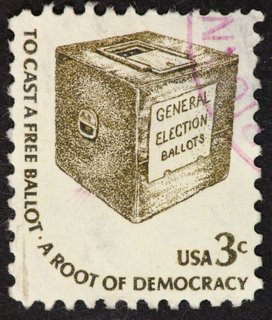 It’s the season of division. I’ve been here before and each time I arrive weary and bedraggled. With only a few weeks until the election, we have parsed and dissected every issue and idea, every offhand remark, every canned refrain. There’s not much left to examine, and so the tone turns divisive and ugly. And I turn inward.
It’s the season of division. I’ve been here before and each time I arrive weary and bedraggled. With only a few weeks until the election, we have parsed and dissected every issue and idea, every offhand remark, every canned refrain. There’s not much left to examine, and so the tone turns divisive and ugly. And I turn inward.
I’ve reached the point in which I can no longer discuss the candidates. Not with friends. Not with family. Not even with the young writers I mentor, many who are voting for the first time.
The other night, during the weekly gathering of the Young Writers Group, I inadvertently entered the political waters. It was a jolt and a disappointment.
It began when one teen — not yet voting age — proudly showed me her Obama button. The girl standing next to her — also not yet voting age — showed her displeasure with a sneer and a sigh.
The three teens in our group who can vote, when pressed for their opinions, said they wouldn’t. They didn’t care. Politics didn’t matter. They didn’t know who to pick.
“I guess I’ll just talk to my friends and see who they want me to vote for,” said one young woman.
“Oh, I don’t really like politics and that kind of thing,” shrugged a young man.
I entered, then, with a bellow.
“Do you like to breathe clean air?” I asked. “Do you like to come here for the Young Writers Group? Because these things in your life are affected by politics. Decisions are made on your behalf. Funding for this organization, for schools, for parks, for this city. These things are decided by elected officials that you can put in place.”
The subject quickly turned, as it often does with a roomful of teens, and we reclaimed our normal — and less volatile — routine of writing and laughter.
My friend Auburn McCanta, who writes for the HuffingtonPost, recently penned a piece that touches on the inability to reach those we love. Its sentiment echoes what I experience with many of the teens I know whose minds and opinions are so young, yet so fixed.
In these last days of the election season, I won’t change your vote. You won’t change mine. I will not spar as sport. I will not debate in passing. There’s no apathy in my silence. It is simply fatigue.
Trying to Pray
This time, I have left my body behind me, crying
In its dark thorns.
Still,
There are good things in this world.
It is dusk.
It is the good darkness
Of women's hands that touch loaves.
The spirit of a tree begins to move.
I touch leaves.
I close my eyes and think of water.
— James Wright
from The Branch Will Not Break
Sunny side on dark days
Sure, they’re fun and fascinating. I read at least three forecasts each morning. It’s not so much for direction but for entertainment value. The what-if, the fresh fiction, the potential a few lines can deliver.
Yesterday’s horoscope was such a lift that I needed just a half-cup of coffee to get a hitch in my giddy-up. (I don’t know who comes up with these idioms but I like to sprinkle them about in happy moderation. I mean, who doesn’t love to say She’s the bee’s knees, or He melts my butter, or That dog don’t hunt).
But back to the forecast. It’s a gem. Who wouldn’t be happy with this?
And, indeed, the day was bright: A dear friend pulled through surgery strong and healed. A young woman offered sincere thanks for guidance and help. A teen girl opened her heart and shared a poem. And my mailbox brimmed with both a package of goodies and a handwritten note.
So, today, I’ve decided to stick with yesterday’s horoscope. I’m living it all week long.
While stocks crash and soar and dive again. While death penalty appeals are denied. While jobs are lost and families flounder. While bills rise and money sinks. While politics reach a screaming pitch. While nothing seems to make much sense, I will walk on the sunny side, setting the tone for days ahead.
Pollyanna? Sure. But what, really, is the alternative?
Poetry & the Postman
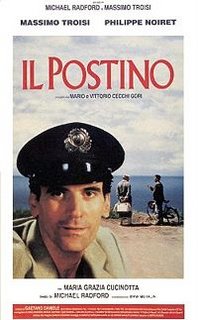 Poetry, letters and movies are a few of my favorite things so my heart was lifted when the three came together this weekend in one fabulous, forgotten film: Il Postino.
Poetry, letters and movies are a few of my favorite things so my heart was lifted when the three came together this weekend in one fabulous, forgotten film: Il Postino.
Set on a remote Italian island, Il Postino is the fictional story of a tender-hearted mailman whose life is transformed by Chilean poet Pablo Neruda, who offers lessons on love, life and poetry.
I’d seen the movie before — in 1996 when it was first released and hailed by audiences and critics alike — but I had forgotten the details of the quiet tale. So, it was a wonderful surprise to enjoy the film again a dozen years later, and from a fresh, poetry-loving perspective.
I won’t give away the details. It’s too much of a gem to let the magic loose. Just find it, watch it, and see your own ordinary life anew.
Poetry
Pablo Neruda
And it was at that age . . . poetry arrived
in search of me. I don't know, I don't know where
it came from, from winter or a river.
I don't know how or when,
no, they were not voices, they were not
words, not silence,
but from a street it called me,
from the branches of night,
abruptly from the others,
among raging fires
or returning alone,
there it was, without a face,
and it touched me.
I didn't know what to say, my mouth
had no way
with names,
my eyes were blind.
Something knocked in my soul,
fever or forgotten wings,
and I made my own way,
deciphering
that fire,
and I wrote the first, faint line,
faint, without substance, pure
nonsense,
pure wisdom
of someone who knows nothing;
and suddenly I saw
the heavens
unfastened
and open,
planets,
palpitating plantations,
the darkness perforated,
riddled
with arrows, fire, and flowers,
the overpowering night, the universe.
And I, tiny being,
drunk with the great starry
void,
likeness, image of
mystery,
felt myself a pure part
of the abyss.
I wheeled with the stars.
My heart broke loose with the wind.
Right now, in 20 words or less
Hymn of the hopeful
In early evening, the sun breaks from its cage, swells the horizon with hope.
- Drew Myron
Scratch (more) words. Make (more) art.
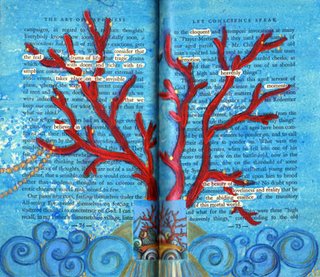 This is how it goes: You crack open a door to discovery and find an even larger room aglow with delights.
This is how it goes: You crack open a door to discovery and find an even larger room aglow with delights.
And so, in my fascination for altered books, I found Karen Hatzigeorgiou, an artist creating contemporary art in the form of altered books and collage. To say her work is stunning is an understatement. It’s a wonderful balance of color and meaning, image and substance. I could sing her praises for paragraphs but I will direct you to the real thing instead: http://karenswhimsy.com.
I am especially inspired by The Art of Happiness. In the poet/artist’s hand, the 1935 book, of the same title, became a tool for emotional exploration. The result is a work-in-progress journal of touching color, collage and ‘found poetry.' (Page 18 is shown above).
“The Art of Happiness is sometimes a book of sadness, disillusionment, and discontent,” explains Karen. “Still, it's important to note that it is also a book with an underlying current of optimism. And in that way, it has become much more of an altered book journal than I ever intended.”
Scratch Words, Make Art
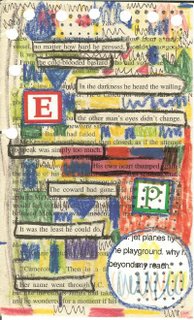 I’m hot off the heels of Forecast, the collaborative painting-poetry exhibition at Weilworks Gallery in Denver, and riding the joy of word-art creations. In fact, I now see creative collaborations at every turn, and I couldn’t be happier.
I’m hot off the heels of Forecast, the collaborative painting-poetry exhibition at Weilworks Gallery in Denver, and riding the joy of word-art creations. In fact, I now see creative collaborations at every turn, and I couldn’t be happier.
My latest discovery was found at a website dedicated to Altered Books (I found this site through StumbleUpon, another wonderful creation. More on that in another post).
The site showcases visual poetry created by artists and writers who have blended forms by scribbling, painting and scratching through books. From a process of word elimination, poetry and art emerge. It’s clever, creative and fun.
Here’s the Idea: Cut the bindings off books found at used bookstores or thrift stores. Find poems in the pages by the process of obliteration. Put pages in the mail and send them around the world. Lather, rinse, repeat.
Many of these pages have been turned into books. Some into pages circling the globe. Still others are works of art, suitable for framing. The possibilities are endless, and I can’t wait to start!
The piece at right, Doubletake Poem 2, is by Donna Kuhn, a California artist.
Yes, exactly.
"Love is an action word."
- Pastor Kenneth Roberts
Anchor of Hope Church
Denver, Colorado
Feed My Mind: Read!
I honestly can’t imagine a life without the books that supported and fed me along the path of childhood, adolescence and into ever-changing adulthood. Can you?
My list of favorite books is always evolving. Here’s a few I love lately:
Ditch-tender by Julia Levine
A stunning poetry collection that is both spare and rich. The California psychotherapist-slash-poet writes in a deep but accessible style that pierces and punctures all the right places.
Dixmont, by Rick Campbell
This Florida poet and professor (and director of Anhinga Press) is a master of the poetic narrative. His latest collection (named after the asylum where his mother once lived) is a great offering of tender insight and wry humor that examines the everyday motions of marriage, parenting, baseball and more.
Torch, by Cheryl Strayed
For her debut novel, the Portland, Oregon writer penned a tugging story of loss. This is a can’t-put-down-book that brought me to tears, and it was chosen as a 2007 "Everybody Reads - Portland" selection.
What are you reading? Let’s celebrate Banned Books Week with a feast of words & ideas that make life rich, ripe and meaningful.


